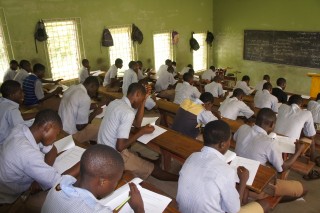In the last four years, the West African Examination Council (WAEC) results for Nigerian students have been nothing short of embarrassing as the country records mass failures yearly. In 2012, there was a 39 percent success rate recorded in the May/June West African Senior School Certificate Examination (WASSCE) results. The following year, 2013, that number dropped to 36.5 percent, 31 percent in 2014 and soon became an issue of national concern. “Why are students failing WAEC?” has been the question on everyone’s lips. According to popular opinion, here are a few reasons why.
The students
Typically, students are the first to receive the blame for their poor performance in the exams. They are accused of being distracted by the internet, social media and television, all of which make them lack the motivation to study. According to Professor Effiong Johnson of the University of Uyo, Akwa Ibom state, research has shown that the increased use of phones by students take up about 60 percent of their daily time, while 40 percent is shared between studying and other activities. There is also the issue of how text message slang has affected the grammar of students, resulting in the poor command of the English language. They tend to misspell and write in abbreviations even when answering exam questions.
The schools and teachers
Substandard schools and incompetent teachers have also been identified as being responsible for the consistent failure of the WAEC exams. The infrastructural decay in the school system; dead amenities, ill-equipped libraries and laboratories. In some parts of the country, schools lack things as basic as a desk, students sit on the floor and learn under trees. Some other schools are understaffed with poor teacher to student ratios. The teachers are unable to give the required time and attention to subjects and topics as they struggle to complete the outlined syllabus. In the end, the students have only a shallow knowledge of subjects, or topics. Most of them are not taught examination techniques and as a result, the students misinterpret questions and provide wrong answers.
Society
Mr. Charles Eguridu, the Head of National Office (HNO) of WAEC, blamed the society, amongst other factors for the poor performance of students in the regional exam. “The values of our society are so distorted,” he told The Guardian last year. “… The Nigerian child is a victim of his environment because children live what they see. People are blaming WAEC but WAEC is not supposed to doctor marks to please the society,” he added.
He couldn’t be more right because society, today, celebrates material and physical achievements more than they do intellectuals. An easy example is the comparison between the gains attached to winning a beauty pageant and excelling in the academic field. The former is celebrated more by society, than the latter.

The examination board and the government
Both WAEC and the Nigerian government are not spared an accusation either as people have questioned whether the system has been set up to continually fail students sitting the examination. Especially as the trend in poor performance is not peculiar to Nigeria alone. Ghana has had it worse. In 2014, only 28 percent of Ghanaian candidates passed WAEC and in 2015, that number reduced to 25 percent. There are also issues of students getting better results in the national examination, NECO, and the fact that the certification system places a lot of emphasis on English language and Mathematics.
The government has been accused of drafting poor education policies and starving public education of funds. UNESCO’s recommendation of channelling at least 26 percent of the annual budget into the rehabilitation of public institutions is not being met, resulting in a lack of adequate infrastructure and an abundance of unenthusiastic, poorly educated teachers. In countries like Japan, teachers are the highest paid civil servants, paid about the same as engineers. According to the centre of international education benchmarking Japan’s philosophy is, “high pay helps attract highly-qualified applicants, and highly-qualified applicants produce very accomplished students…” It’s no wonder why Japan boasts one of the world’s highest performing education systems.
Clearly, one or all of these factors could be responsible for the mass failure recorded over the past few years. Now, the question is: what is the way forward? Bearing these factors in mind, how can the government, WAEC and other educational stakeholders, including parents, create interventions that will put an end to the string of bad results? Are there any engagements between WAEC and the various stakeholders beyond the examination? Quite a number of questions, but very few answers, perhaps what we need is to simply create an education system that is unique to us, not replicating or implementing a foreign system of education.








